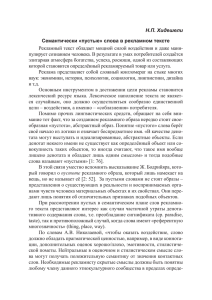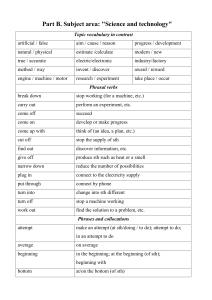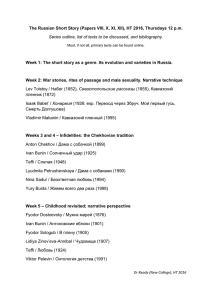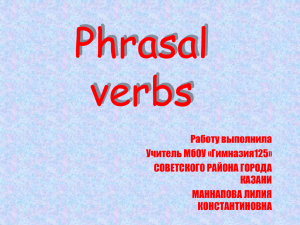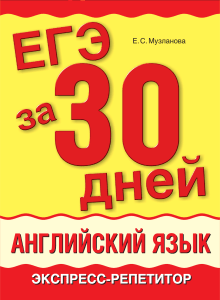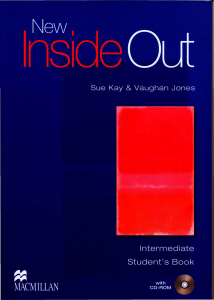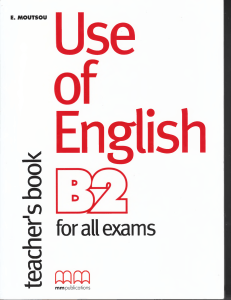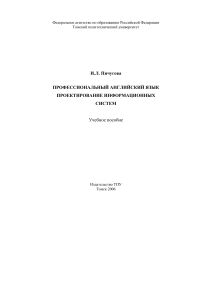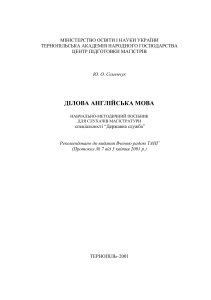Russian words difficult to render in English or
реклама
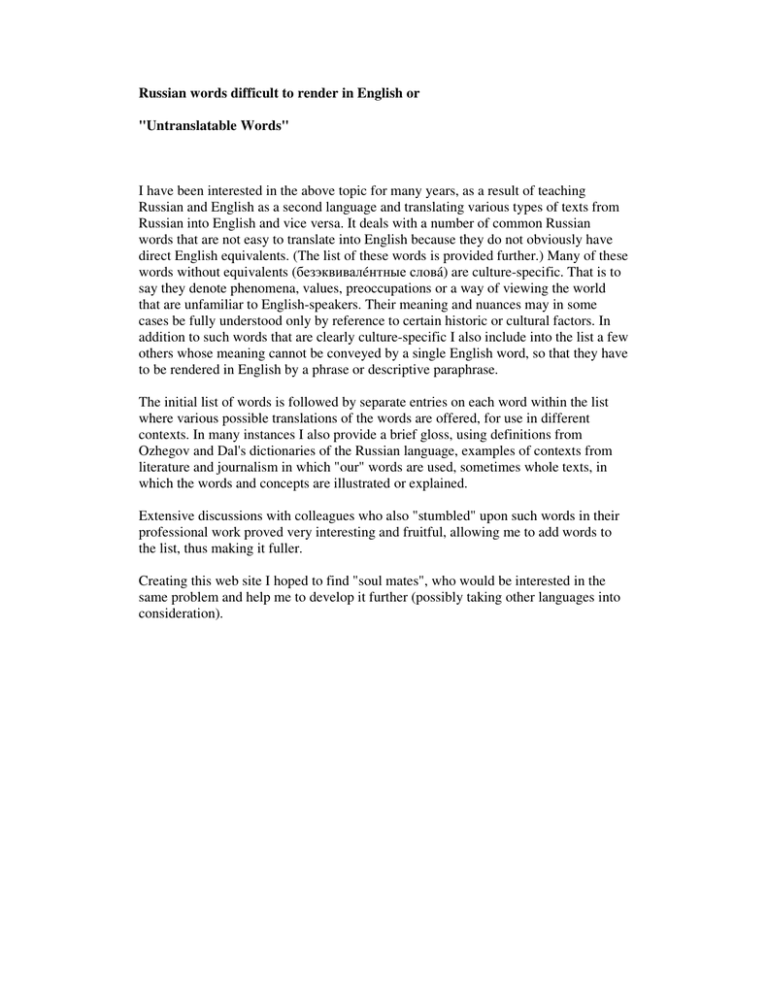
Russian words difficult to render in English or "Untranslatable Words" I have been interested in the above topic for many years, as a result of teaching Russian and English as a second language and translating various types of texts from Russian into English and vice versa. It deals with a number of common Russian words that are not easy to translate into English because they do not obviously have direct English equivalents. (The list of these words is provided further.) Many of these words without equivalents ( é á) are culture-specific. That is to say they denote phenomena, values, preoccupations or a way of viewing the world that are unfamiliar to English-speakers. Their meaning and nuances may in some cases be fully understood only by reference to certain historic or cultural factors. In addition to such words that are clearly culture-specific I also include into the list a few others whose meaning cannot be conveyed by a single English word, so that they have to be rendered in English by a phrase or descriptive paraphrase. The initial list of words is followed by separate entries on each word within the list where various possible translations of the words are offered, for use in different contexts. In many instances I also provide a brief gloss, using definitions from Ozhegov and Dal's dictionaries of the Russian language, examples of contexts from literature and journalism in which "our" words are used, sometimes whole texts, in which the words and concepts are illustrated or explained. Extensive discussions with colleagues who also "stumbled" upon such words in their professional work proved very interesting and fruitful, allowing me to add words to the list, thus making it fuller. Creating this web site I hoped to find "soul mates", who would be interested in the same problem and help me to develop it further (possibly taking other languages into consideration). List of Russian Words that are difficult to render in English á ó ý ý ó á ý é / é / é ó á ó á é á á á ó ó ó ó c c ý é ó ý / é ó ó á ó é ó ó á ý é ó ó ó / é / / é á ó á á ó á / é á / é / á ó á adventurous, animated, passionate; heated, venturesome; describes sb who gets carried away with sth (see also á below) or is prepared to stake a lot on sth or, eg a á é = gambler (fig); also a á : games of chance, gambling. . , , ( , , ) . , . . . . . ó absence of roads; bad condition of roads; season when roads are impassable , " ! . # # # .! $ , , , , : : ... $ %.& $ ... ý literally: person with white hands, ie sb who shirks rough or dirty work; softie ' ( # ), . , ( , . ).* # - - ! : %.+ . , , ý literally: weekdays, working days; fig humdrum life, colourless existence, the everyday; antonym of á (see below in this section) 1., , # ) .; , , . , . 2. . . , . , , ,.) - , ( , ? . . way of life; everyday life, daily routine, habitual pattern of life; drudgery. The word (derived from the verb ) evokes the material world and a static conservative form of existence. .! , * . . , . - family life; - in private life. # life; . . - rural life; - a new mode of ... he distinguishes culture rather severely from byt, the habitual pattern of daily life. S.Monas The dross of customs, institutions, everyday drudgery that Russians call byt. G.Freidin ... , , , " , , ,- , , ).& . ./ ,.* ' ' , # - . ! 0 ( . ó freedom, liberty, free will. The word implies lack of constraint, natural freedom, even a state close to anarchy. 1. - . . , " - . . 2. - , . - , + . 1 , . . .! # ... “ , ,“ , ”- ” .“ “ , ” , . ”? ' , - “ , , ). 1. * ” , ., , # .0 , , - , , .. . *. , , .( . ?. . ?. , .. .) 2 , : .3 2 . , á / to make some public statement or appearance, eg á , to speak in Parliament; á , to write in the press; , to appear for the defence (in court); á , to be interviewed on/give a talk on radio; , to appear on television; á , to give a paper; é , to make a speech , - - (% ) . , , . - " " , - 2 ( , , # ".! . .% . , (f) destruction, ruin, wreck, downfall, death (esp tragic, violent death in war or as a result of an accident). English lacks a general noun from the verb to perish ( á / ). , 4 , # ( . . * 2 . . ,.5 , .. II - , ( ) / ( %.! , # .- :, ( # II . # ) 2 ( .4 1.! . , . & 2 - ! - 1935 ) / , ! # , : . ,.* . , ( 2 , ý , ý person on duty, eg at the entrance to a block of flats or to a hotel corridor; the word suggests sb who keeps watch - " . ! . ( 2 ... $ # ( 2 . * # , 2 é (m) literally: sb who does sth, agent, but usually only meaningful in combination with some adjective, eg á é , statesman; ý é , writer, journalist, man of letters; é é , public figure; é , educator; é , politician 1 2, # - . . é sincere, cordial, heartfelt, having soul ( #á) . ! 4 ! ( %.+ # ) . - , . *.5 2 . - , ! 1 ! . - , , .% 2 ." 2 1 ' *.5 2 . ! -./ , 2 . ! / - . %.& " - . ) $ . - .$ . , %.& .$ ... . é natural, in the sense of bound to happen; in conformity with some law (ie a natural order of things, not necessarily or even primarily a juridical order); normal or regular in one of these senses; ó , legitimate, ie in accordance with the criminal or civil law ... . . (5 - - ...; . , .. # . , . , .) ".. 6. * ...) , 6 - .., “ 2 2 . ".. . 2, ! ” - ó stagnation (fig), ie political, economic, intellectual stagnation. The word evokes the climate of the Brézhnev period of the 1970s as Russians perceived it at the time of perestróika in the 1980s. . * , , ( , , ( , ... . ..$ , % ( . !.1 . . . “ ” . % ., . 1993. , , , .* 4 . .% ".- . .! 2 - , . / fellow countryman, fellow-townsman, fellow-villager; a person from the same district 4 " ! - 2 , 6 . - ( # . ) . , , % . * 1 . , 5 2 , , .* 2 , / " 1881 % ' # .7 , 2..$ , ,* . &.5 ... ' 82, 1991 , - ... evil, bad, wicked, malicious, vicious, unkind, ill-natured, angry. There is no adjective in English that conveys the full range of meaning of , which may be best defined as the antonym of ó . 1. 5 ! 3 .(5 . 3. ! , , , - , - - ; 7. 9 , . , . , , . , , ... 4. .) 2. . # .) ,( &.) ; # .' , . - / Even a British or American undergraduate taking Russian and Philosophy is almost certain to find the short first part of these Zapiski hard going, even if (s)he reads it in English. Hence the value of the book under review. First it provides us with a generally (but not always) accurate new translation (though no translation can do justice to features like the repeated use of ZLOI, ZLOST`, OZLOBLENNYI and ZLOBNYI (fifteen times in the first chapter)... Review of Martin Dewhirst; Universiy of Glasgow Michael R. Katz, trans. and ed. Fyodor Dostoevsky. Notes from Underground. N.Y. and London, 1989. é intelligentsia, professional class(es). The word denotes a group of intellectuals who are politically engaged but at the same time are excluded from power and who feel a sense of moral responsibility for the state of their society. , / , / 2 , , , ., 2, , , 1921 , . , ..- . , . , / , .% , , .5 % ( , # ! , , . - . ".3 , # ..$ 2 , . . , . % , ( ( . .% # ( , , , ( . . ó business trip, mission, posting 1.- , 29 1974 " # , / . - . , . 2. ! , / !. 1.* # , , . " # ( 2 , ... -.: ./ á groats; a general word for grain from which kasha can be made ! .(- , 2 4- .) * " ; . , - . # . , ; . 2 ; # ; 2 , 2 ! %.+ , .% - ý big, large, large-scale, outstanding, important; major, well-known. The adjective implies that all the elements of a thing are large, eg ý , long-grain rice; antonym of é (see below in this section). 1.- . 3. * . # , # , . ... “ ”, , . 4. " , ( . , ). 2. * # , , # “ ”, ... ( ... 2 , , ( . - , , ".. .! ó face; person, eg á 2ó, civilian; é 2ó, character (in play); ó 2ó, an official; ó 2ó, clergyman; ó dummy, man of straw. Note also: ( 2ó, physical person (leg); 2ó, juridical person (leg). 1.! . . .! .5 2 2 . 2.) . 3. $ 2ó, , (f) personality, person, individual " ", $ , . .- - ./ , 2. . á á / to enjoy looking at sth. The verb may sometimes be translated by English to admire but it implies feasting one’s eyes on sth, including natural beauty. . / . 2 - , , . ; . , , . , .- ". < ? . " , ... . , “ , # %.- , - . ." , 1993 , . , , ” ” . ".- ..." “ , 2 2 . , ... , &.. 3 ; .! ”. 4 “ .5 / 2 ./ , , 8, 1993 , é small, fine (of rain, sand); also petty, shallow. The adjective implies that sth is small in all its parts, small-proportioned; antonym of ý (see above in this section). 1. - , , , . , -% . , ' % - , , 2. . 5. , . , ( . 4. 5 ). 6. ) 4- . # , .) . ( . , ... ? # , # # . ... , # .! ".. ... . 2. , , * *.- .* (person) (the phenomenon) (adj) á á petty bourgeois person; petty bourgeois behaviour/attitudes. The words are used in a figurative sense to evoke sb who is narrow-minded, philistine, or such behaviour; in Soviet parlance they were used as pejorative terms to describe a selfish mindset. % . %. . %. . % : 1. , . 2. ! . . ! ..., " , 2 # . . 2 . *., , , .* , ,.' , ., 5 5 2 # ... 2 This was in Nizhni-Novgorod, and in the social milieu of the worst description - that of the MESHCHANE, in status just above the peasants and on the lowest step of the middle class - a social milieu which had already lost the wholesome relation to the soil but had acquired nothing to fill the vacuum thus created, and therefore one that became a prey to the worst vices of the middle classes without their redeeming qualities. V.Nabokov.Lectures on Russian Literature. Maxim Gorki. é view of the world, set of beliefs, philosophy. The word implies something more systematic and coherent than English outlook; cf German Weltanschauung. - , . . sth which one cannot take one’s eyes off. The word denotes the quality of an object, admiration of which one might express with the verb á (see above in this section). 1 , . , # . , . ... . , ." , & # . , . , ; ; . $ , *. ! , # . . ó newly erected building, building work in a new town or district. The word brings to mind the rapid urban development of the post-war Soviet period. 1. , , , , # . . . . 2. . , ! , . .5 ?' 7 " . , .9 . á (m) inhabitant, citizen, the average man, the man in the street; fig philistine. In Soviet times the word was used as a synonym of , ie a narrow-minded person without social interests; it may now be reverting to its pre-revolutionary role. 1.( 2. ( ). ! .) $ (< # - , ) - # . .-& , . “ 2 ”, 2 &.* , .' % ., . ".< , 1992 , . 2 , , . " ., # . sb who has had only one love in her or his life or who can love only one person at a time ' , . - ' .! , “ ” # . .! 3- . , 0. , # . # , .% ( * , .1 6.' ) ." . . p 6 .) 1994. to have a drink to cure a hangover, to have a drink the morning after / ." 2 . (% ) , . . , , , %. & " . , .! . . . 7. , .* # . ó describes sb who loses her/his temper with sb else but does not subsequently harbour resentment towards the person who angered her/him 1 , , . . , -* ?, ,- . , . , ; . , 0 ,7 , . , " . .9 . ó next in turn, periodic, recurrent, regular, routine, usual. The word is derived from ó (f), queue. 1. 2. ! . " . .- . . . , .- . . 2. , . . 3. - % " 4 , # , , . ó heroic deed, feat, act of heroism, sth done for the general good , & , . 5 “ , # , - 1,2 1993 , # .3 # . , , # , 2 , , # ' , ".- # .! ".. , . : ”, 2 ... - , .1 . . , , . , # ' . , $ 3 .! , ! / , , . , ó ó (adj) (f) morally low, tasteless, rude, common, banal, vulgar; an object or act that can be described in this way. No single English word has the same field of meaning although tacky, a recent borrowing from American English, does convey the same notion of lack of good taste. , , . !. # . !. 1. , , & ”, “ . !. ... 2. ) , . , , , . , ,( # .' ... , , , . %.& , , , , * - . , ... ) , ; ; ), & ,- . , # # , , .% 2 , . . . , , . 2 ”, . - ,.* , , ..., , , “ ., * . !. # .- , 1917-1918 : , .! , 1971. English words expressing several although by no means all aspects of POSHLUST are, for instance: `cheap, sham, smutty, pink-and-blue, high-falutin`, in bad taste. Nabokov`s lecture on "Philistines and Philistinism." á holiday in sense of festival, national holiday, festive occasion, occasion for celebration, red-letter day; antonym of ý (see above in this section) 1. ! 2. " 3. 4. . , . , .) . 2 . !. , . .-% -- . . - .-. - , , , 2 ... , -, % “' - ”- , . . . - ? . . , ,. & , .. “! 2 ”, 2- 2 ) 9 , .. , 0 6 “% ” 1993 . ./ ).* , . -! " , , ( .. , ) # . , . . ".- * . . . , . " , . !. , - , -, - - .! - / ." ).& .! , ( , ó (pl) send-off, occasion or process of seeing off sb who is leaving !. ! “ . . !. , - ; ”. , 2 . , , , . , ,, , . , . !. : - , ... , , -.% # . ) # . " . . ,. * .! ó space, spaciousness, expanse, scope, freedom, elbow-room. The word evokes the wide open spaces and seeming infinity of the Russian landscape. 1. / ! ! ! , , .- # . . , ; ). . 2. - ... , " # 4 ( , , ( # . . ). , , . ".). ! # , , , ".! . . . - ... ! # , , ó synonymous with 1. ! 2. ,# .- 1. < , ( , ó , - )... , .< . .) .( , . : - ; , # . ".! 1 .5 , . , 2, - ./ , 1993 á scope, range, sweep, scale, span, amplitude. When applied to character the word may suggest an expansiveness and generosity that is admired. , 1. , . . . , , / , .* , . . 2. / , # . . . ( 2). /. ( 2). /. . , , % : ; , . 3. ! .< . 4. . - , . , . . / ( , , " ), & 2 , . 1.- ...$ ( , , . . & # , ) , .4 ! .- / 2 . . , # -.: ./ .& 2 , ý ruin, collapse, devastation (esp after war, revolution or some other cataclysmic event) , ! -! , . / . , " ,0!. . # , , .; . .% (- ) ... ( : , .) ,.& 2 . . *.! ... . - 9 ( .- ./ 1,2, 1993. , / , ). , 1993 é / é person of the same age - $ . . : # & %.- / .1 , , . .1 . .1, 1993. , ó one’s own (by blood relationship), native, eg ó , native language; as substantivised noun = relations, relatives, kith and kin; antonym of ó (see below in this section). The word has strong positive connotations. , 1. /. 3. . . /. , . . 2. . , . /. . , !) $ , , # , . , , # ".* ( ) , # . , ,2 / - , , . ) , , ." ".$ 1 - , , , . 2 1993 .1 / ... (adj c ó ó ) a person who possesses natural gifts but lacks a systematic, thorough education; (of metals) nugget, piece of mined metal in chemically pure form 1. . 2. .$ # . - - . . , 1863 - 1866 ” ".). " . - “. . . . ) .! .3 “, # ...” “ ” *.! ' # ". 1 # . 2 .).;( . , “' # , # .5 , , , , ? :% # . ,! # . .! , - . / ; . é / é synonyms of é $ / / é - . , , ...! # , ' . ; . , 2 , ' “1 . ( < 2 ... . 2 ”. , - . , , : 6, 1993. # ; . .1 ./ 1, 1993. 4! 2 # , , # , .! . ;.! & ., ,/ -.: .1940- . ' ./ * . ! one’s own, my/your/his/her/our/their own; close in meaning to ó (and therefore also having positive connotations) and an antonym of ó . Note: é = person who is not related but whom one trusts. 1. - , .) - ). 2. / . (. - , " # ., , , , , : “3 + , $ # .” . .% ".. / 4 - .. , % . . 1993 , $ 1.! ... , ! .! # , ".* ." . .- ,.* . , . .4 ... , % . (" # # :: . , á to put the evil eye (on) : " . . , , ) ; - / - , . , *.! . 9 ó unbroken, continuous, all-round, complete, entire, total, eg # ó ó , unbroken fence; # ó , complete satisfaction; # á á , one-hundred-percent literacy. 1. ) , .) 2. ! . . "6 " , . "$ ” " . ” # , ( , , 2 & ”& # : ”, , , # “- # , " 4 ” " ” , " , , ( 6. & 9 # . (- , - 1 2 ” 3, 1993. -. 19. , , ," , # . . ” period of time, term, deadline 1. " (! ...- . (, .) 2. % .! 2 2 , .5 . 2 . / ".(- 2 ) , .) , . , 2 # , .! / - . -.: .! , / - . . ó well-proportioned, elegant, shapely, well-balanced, harmonious, orderly, well put together. The word evokes sth that is aesthetically pleasing, pleasant to the eye. 1. . , . -. # . -. -. -. . 4. . -. . 3. ) . -. ,! 1 1 "./ “- , . 2. ! . . ... % 2, , % ” ".. # . . # # : , .! # 2 . , # , .! , . á ( )/ é ( ) + instr to be carried away (by), to become keen (on), to be mad (about), to fall for, to become enamoured (of). The word suggests great enthusiasm. 1. + . - . , ! . " . , , . .4 - , %: ' . .% , . . - , , , ... , , .- ,.) ... , .% ( - - " - - . 2. " # # , . “ ”, . 4 . ..$ ! , ( . % ; ., . 1993 0 2, , , 4 - ,- , *.! . 9 # , . , á / é to have time (to do sth), to manage (in time), to succeed (in doing sth in time) 1. 4 4 - , , - . . .) .( - , . 2. ., , # . . , . ... 1.% 1 . 4 % , 19 ---/ 1991 # -.: / 1, 1993. , % . .9 á á / á (all pej) lout, boor, cow; loutishness, boorishness; loutish, boorish. X denotes a person who behaves in a crude, disgusting way and has no respect for herself/himself or others. (The word derives from the biblical name Ham, who in Genesis 9 saw his father Noah naked and told his brothers.) : : , , .: : , , . : , . . , " # # , 1 .! , . . : “% “ “% ! , ”( ” “ ,.' ”, “ . ” , ” ) ,.' ”. - ., “ ” # . “ , - “ ”, ”, 2 10 1817 , , “' .) , # . .* .” .) 7. 1 ..." . $ .% 7.1 ... “ , .5 5.! ,.' , 2 . :, 11, 1993 ó sb else’s, other people’s, not mine/ours; foreign, alien, strange. The word is an antonym of ó and and therefore has negative connotations. 1. , , - , - , . 3. . , . - ! , , , ., ." - $ , . 2. , , , 2( , ., . , # .) , . .) ". . “ , : ”, . “ , ” - 7., ! ( “ “ ” ), ” , . ." &.. : “: !” ! * , , ) , # . ". (*.! 119, 1993 , # , , , # , -. % # 7 , - .* . .9 , . ) . ;.! .- *.! .
